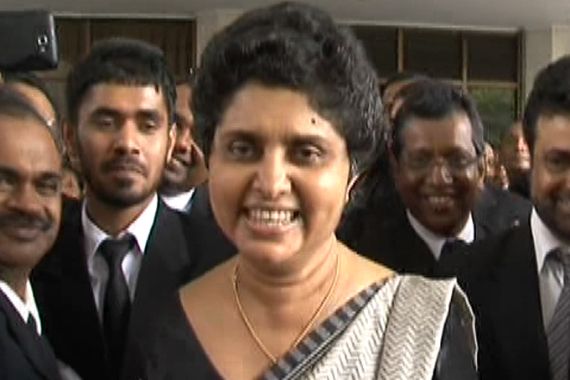Sri Lanka fires first female chief justice
Rajapaksa dismisses country’s top judge after she was controversially impeached over a range of charges.

Mahinda Rajapaksa, the Sri Lankan president, has sacked the chief justice days after parliament voted overwhelmingly to impeach her.
Rajapaksa dismissed Shirani Bandaranayake, the first woman to hold the office of top judge, after holding a closed-door meeting with other judges on Saturday, reported the AFP news agency, citing a presidential spokesman.
The judge’s impeachment is widely seen by jurists and rights activists as an attempt by the government to ensure a pliable judiciary.
“The president this morning signed the letter removing Shirani Bandaranayake from the office of chief justice,” Rajapaksa’s spokesman Mohan Samaranayake said.
“The letter was hand-delivered to her by a secretary accompanied by presidential security staff.”
The impeachment had been annulled by the country’s highest courts, which ruled that the process was unconstitutional.
A spokesman for Bandaranayake confirmed that she received the letter sacking her, but declined comment. No replacement has been named by the government.
Financial misconduct
Sri Lanka’s Sunday Times newspaper said Rajapaksa had offered to allow Bandaranayake to retire and so avoid impeachment during a meeting on Saturday with other supreme court judges, but a source close to her told AFP that she was not amenable.
Rajapaksa’s spokesman would not comment on what was discussed in Saturday’s meeting.
The ruling party initially brought 14 charges of financial, professional and personal misconduct against Bandaranayake, but later cleared her of financial wrongdoing and convicted her only on three counts of misconduct.
Legislators had found her guilty of tampering with a case involving a company from which her sister had bought an apartment.
Other charges included her failure to declare dormant bank accounts, and of staying in office while her husband faced a bribery charge.
Rajapaksa, riding a wave of popular support after ending a 25-year civil war in 2009, has rammed through laws ending term limits for the presidency and abolishing independent commissions that select top judiciary, police and public service personnel.
He now has the power to appoint many of the country’s officials.
A refusal by Bandaranayake to vacate office would create a crisis that has no constitutional remedy. The Bar Association of Sri Lanka, with 11,000 lawyers, has vowed not to recognise a replacement to Bandaranayake, and the country’s Supreme Court judges may not welcome a new appointee.